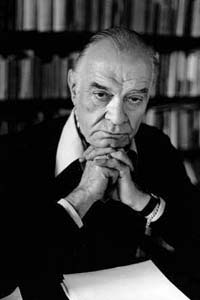Denis de Rougemont facts for kids
Quick facts for kids
Denis de Rougemont
|
|
|---|---|
 |
|
| Born | 8 September 1906 |
| Died | 6 December 1985 (aged 79) Geneva, Canton of Geneva, Switzerland
|
| Education | University of Neuchâtel (B.A.) |
| Spouse(s) | Simone Vion (m. 1933–1951) Anaïte "Nanik" Repond (m. 1952–1985) |
| Era | 20th-century philosophy |
| Region | Western Philosophy |
| School | Continental philosophy Personalism Non-conformists of the 1930s |
| Institutions | École libre des hautes études Graduate Institute of European Studies, University of Geneva |
Denis de Rougemont (born September 8, 1906 – died December 6, 1985) was a Swiss writer and thinker. He wrote in French.
He was part of a group called the "non-conformists of the 1930s." This group believed in new ways of thinking about society and politics. Denis de Rougemont often wrote about the dangers of totalitarianism, which is when a government has total control over people's lives. He shared his ideas from a Christian point of view. After World War II, he became a strong supporter of European federalism. This is the idea of European countries working closely together, like a team, to build a stronger, more peaceful continent.
Contents
Life and Work
Early Life and Studies
Denis de Rougemont studied at the University of Neuchâtel in Switzerland. He also spent time studying in Vienna. In 1930, he moved to Paris, France.
In Paris, he started writing for and editing different magazines. He joined groups of thinkers who were interested in "personalism" and the "non-conformists of the 1930s." With other thinkers like Emmanuel Mounier, he helped start magazines such as Esprit and L'Ordre Nouveau. He also co-founded Hic et Nunc, a magazine about religious ideas, with Roland de Pury.
Defending Switzerland During Wartime
In June 1940, during World War II, Denis de Rougemont was worried. He feared that the Swiss government might give in to the Germans. He wanted to protect Switzerland's traditional democratic values and independence.
So, he worked with Professor Theophil Spoerri from Zurich University. They gathered a group of young people to create a group called the Gotthard League. This group aimed to defend both Christian values and Switzerland's freedom. De Rougemont wrote the group's main statement. On July 22, he wrote an "Appeal to the Swiss People." This message was published widely in Swiss newspapers to get support for the movement.
Time in the United States
Later in 1940, Denis de Rougemont wrote a strong article in a Swiss newspaper. This article made the German government very angry. Because of this, he was sent to the United States. There, he helped run French radio shows for the Voice of America. He also taught at the École libre des hautes études in New York. He returned to Europe in 1946.
Promoting European Unity
After the war, Denis de Rougemont worked hard to bring European countries closer. In 1950, he started the "Centre Européen de la Culture" (European Cultural Centre) in Geneva. In 1963, he founded the "Institut Universitaire d'Etudes Européennes" (Graduate Institute of European Studies). This institute was connected to the University of Geneva. He also led the "Congrès pour la Liberté de la Culture" (Congress for Cultural Freedom) in Paris. This group worked to promote freedom of thought and culture.
One of his most important books is Love in the Western World. It was first published in 1939.
Legacy
Denis de Rougemont's ideas about European unity and personal freedom continue to be important. The 1989–1990 school year at the College of Europe was named in his honor. He is buried in the Cimetière de Plainpalais in Geneva.
Major Books
- Les Méfaits de l'Instruction publique (1929)
- Le Paysan du Danube (1932)
- Politique de la Personne (1934)
- Penser avec les Mains (1936)
- Journal d'un Intellectuel en chômage (1937)
- Journal d'Allemagne (1938)
- L'Amour et l'Occident (1939, revised 1956 and 1972), translated as Love in the Western World (US) and Passion and Society (UK)
- Nicolas de Flue (1939)
- Mission ou Démission de la Suisse (1940)
- Qu'est-ce que la Ligue du Gothard? (1940)
- La Part du Diable (1942/1944) translated as The Devil's Share
- Les Personnes du Drame (1944)
- Journal des deux Mondes (1946)
- Doctrine Fabuleuse (1946)
- Vivre en Amérique (1947)
- L'Europe en jeu (1948)
- Lettres aux députés européens (1950)
- L'Aventure occidentale de l'Homme (1957)
- Comme Toi-Même (1961), translated as Myths of Love (1963)
- The Christian Opportunity (1963)
- Fédéralisme culturel (1965)
- La Suisse ou l'Histoire d'un Peuple heureux (1965)
- Journal d'une époque (1926-1946) (1968)
- Les Mythes de l'Amour (1972)
- L'Avenir est notre Affaire (1977)
- L'Ecrivain et la politique: les problèmes de l'engagement (1978)
- Vers la relance du débat européen? Le déclin de l'Europe, mythe et histoire (1978)
- De l'Europe des Etats coalisés à l'Europe des peuples fédérés (1978)
- Rapport au peuple européen sur l'état de l'union de l'Europe 1979 (1979)
- Formule d’une Europe parallèle ou rêverie d’un fédéraliste libertaire (1979)
- Inédits, ed by Jean Mantzouranis and François Saint-Ouen (1988)
- Dictionnaire international du fédéralisme (Dir.), ed by François Saint-Ouen (1994)
See also
 In Spanish: Denis de Rougemont para niños
In Spanish: Denis de Rougemont para niños
- Robert Aron
- The Little Prince
 | Roy Wilkins |
 | John Lewis |
 | Linda Carol Brown |

